Thursday Feb 26, 2026
Thursday Feb 26, 2026
Thursday, 6 August 2020 00:10 - - {{hitsCtrl.values.hits}}
This column appears on the day after ‘E-Day’. It is a good time to discuss thematic political issues, including those that go beyond the elections. 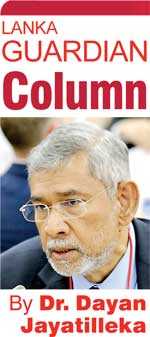
Most pressing are two core issues which I had flagged back in 2013, the answers to which we shall know with the results of this election.
Interviewed at length by this newspaper in 2013, I stated (in response to a question posed by Chamitha Kuruppu) that: “…there has been an intra-regime change. The centre of gravity is shifting from the pragmatic populism of Mahinda Rajapaksa to a harder, harsher neo-conservatism which is more visibly represented by Gotabaya Rajapaksa… ‘Mahinda Chinthana’ is in danger; it is increasingly overshadowed or overtaken by the ‘Gota Chinthana’…Sri Lanka cannot successfully manage relations with its minorities and also with the neighbourhood and the world as a whole with a bunker mentality.” (‘We are on the road to losing the peace’, Daily FT, Friday 10 May 2013, pp. 11, 15)
This election will show how far that process has gone towards irreversible completion.
In the same category is the question of the UNP in particular and the Opposition in general. Also, in 2013, Ceylon Today ran an interview with me captioned with the quote “UNP has no future with Ranil”. (Thursday, 26 September 2013).
We shall see presently whether that proposition has proven correct.
Real story of 19A
The crisis of the 19th Amendment is the issue foregrounded in the campaign and most directly impacted by the election. The commentaries for and against, ignore the very context and real dynamics of its passage and aftermath.
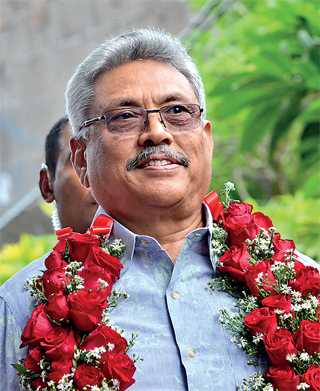 |
| President Gotabaya Rajapaksa |
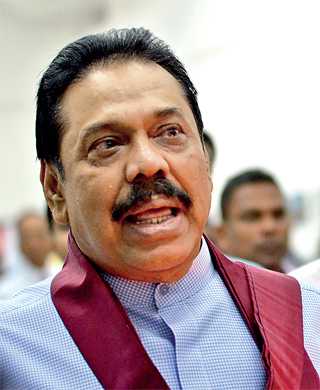 |
| Former President Mahinda Rajapaksa |
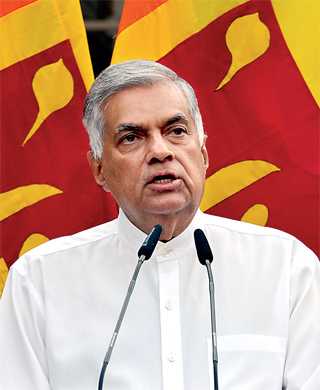 |
| UNP Leader Ranil Wickremesinghe |
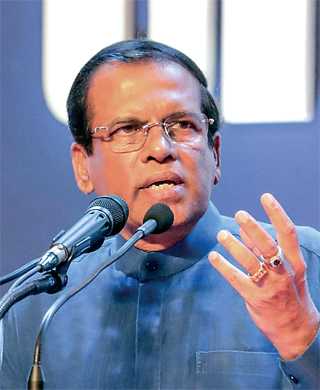 |
| Former President Maithripala Sirisena
|
The Yahapalana victory contained within itself an inherent contradiction which blew it up eventually. The problem was that the candidate had signed two agreements, one which committed him to abolition of the executive presidency, and the other, to the elimination of its surplus power.
The neoliberal UNP leadership, the TNA and their supportive ‘civil society’ interpreted the mandate as one of abolishing the executive presidency. The SLFP dissidents—including the newly-elected President—the JHU and the Liberals had a counter-interpretation that the mandate was to abolish the autocratic powers of the presidency, not to abolish the executive presidency itself.
The published text of the manifesto corroborated the latter view. Champika Ranawaka and Rajiva Wijesinha, who contributed greatly to the drafting, confirmed this unequivocally. There was a much more pragmatic consideration at work here. The definitive text, the manifesto, explicitly committed the President to remain within reforms that would not, repeat not, require a referendum. This was because the breakaway SLFP moderates were veterans of the failed, protracted effort during the far stronger CBK presidency to promulgate a new constitution and didn’t want to be drawn into that quagmire.
Driven by his pressing existential need to dismantle a directly-elected executive presidency which he was notoriously unsuccessful in aspiring to, Prime Minister Wickremesinghe came up with a draft text of the 19th Amendment which far exceeded the mandate of the Sirisena manifesto and sought the abolition of the executive presidency. Having lost Presidential Elections twice (1999 and 2005) and conceded the candidacy to non-UNPers twice (2010 and 2015) as alternative to fielding Karu Jayasuriya, the only way Ranil could become the country’s leader while remaining UNP Leader was to vampirically drain away all presidential power to the prime ministership.
When the Wickremesinghe draft of the 19th Amendment was presented, there was some element of confusion within the Joint Opposition, with Prof. G.L. Pieris having concurred with the PM at the Parliamentary discussion and Vasudeva Nanayakkara supportive due to the old Left commitment to restore parliamentary sovereignty. Mahinda Rajapaksa was initially agnostic and partly convinced that Wickremesinghe’s move may benefit him but, in a conversation, I had at the Abhayaramaya, he was utterly dismayed at the gutting of the presidency and the weakening of the State.
I was invited to speak at a conclave of Opposition MPs on the lawn of Prof. Pieris’ residence and intervened strongly against supporting the abolitionist Wickremesinghe version. The alternative that was readily arrived at by the JO headed in Parliament by Dinesh Gunawardena, was that negotiations would take place with the SLFP and President Sirisena, intended to draw the SLFP faction in government away from the Wickremesinghe position, to a centrist position of reforming the presidency rather than abolishing it—and thereby strategically constituting a countervailing centre-space in parliament.
Meanwhile I had urged Udaya Gammanpila to file a case in the Supreme Court challenging the Wickremesinghe draft of 19A, which he did, deploying Manohara de Silva, PC. The Supreme Court marked several provisions that would require a referendum and suggested revision to certain other provisions, which if suitably changed, would require only a two-thirds majority in Parliament.
That was the basis on which the two wings of the centre, the pro-MR and pro-Sirisena tendencies, converged in Parliament. The outlier was Sinhala ultranationalist hyper-centralist Rear Admiral Sarath Weerasekara. The UNP came around, despite the extreme reluctance of the then PM, who in his closing Parliamentary address on the occasion, stated that this was a transitional compromise and that his party would move swiftly to present a new constitution which would abolish the executive presidency.
Wickremesinghe followed this up in a live interview on TV given to Upulshantha Sannasgala on the occasion of the first anniversary of his assumption of the premiership, in which he criticised me by name, twice. Earlier he had mentioned me in the Parliamentary Select Committee and angrily told the JO and SLFP that they could “go with the analysis of Dayan Jayatilleka”.
The 19th Amendment as it was actually voted through was not an attempt to dismantle the executive presidency, though the original draft of Wickremesinghe, which did not get past the Supreme Court, was. 19A as it was promulgated, was that rarity: a saddle-point between those who wanted to retain the presidency of the 18th Amendment and those who wished to abolish the directly-elected executive presidency. In other words, it was a valuable ‘middle path’ between those who wanted the Jayewardene-Rajapaksa presidency and those others who wanted a return to the Westminster model in its 1972 variant. The existing 19th Amendment is also a rarity in that it reflects a negotiated consensus that was broad enough to garner a two-thirds majority in Parliament.
What went wrong?
Why then is 19A in crisis and so vulnerable? That’s because of what happened afterwards, and what always happens to any Middle Path or Golden Mean: it is besieged by extremists on both sides. All it takes is for one set of extremists to start the process going and then the pendulum swings from that extreme to the other. And here is how it went.
Instead of living with the compromise undergirded by a broad consensus, Wickremesinghe returned to a mode of conduct first displayed when he was PM under the CBK presidency (2001-2003), and which got him dismissed for the first but not the last time. He behaved as if the executive presidency did not exist and as if he was the country’s leader. He behaved as if his original draft of the 19th Amendment had taken effect and not the actual 19th Amendment as commended by the Supreme Court and passed by Parliament.
This caused resentment and friction with the Executive President and his party, which was losing ground to the MR-led nationalist wing. President Sirisena proceeded to do exactly what President CBK had done earlier, namely to dismiss the PM. Different Presidents, same PM, same behaviour, same result. Except that the Supreme Court overturned it as not in conformity with the new 19th Amendment. Thus restored, Prime Minister Wickremesinghe, his neoliberal ideologue the Finance Minister and their supportive ‘civil society’ once again behaved as if what had just been upheld by the Supreme Court was not the 19th Amendment actually on the books, but the original maximalist ‘abolitionist’ draft.
This was the context in which the Easter carnage took place, because the State apparatuses were either grinding confusedly to a halt or were caught between two power-centres and striving to balance between them while tightrope walking.
While Easter Sunday catapulted the GR project to the top, what fuelled and catalysed the rise of the Gotabayan Alt-Right, was Ranil’s masochistic self-flagellatory co-sponsorship of the Geneva 2015 resolution; ignoring of the UNP and SLFP’s defeat at the hands of the newly formed SLPP at the local government election of 2018; and bypassing the broad centrist consensus of the 19th Amendment, driving for a new constitution with non-unitary wording way beyond the 13th Amendment.
Initially the Gotabaya camp was agnostic about the presidential/parliamentary conundrum because the Sinhala Far-Right influenced by Dr. Gunadasa Amarasekara had long canvased the view that the JR Constitution empowered the minorities whose support was indispensable in winning the presidency. This supremacist perspective had been underscored by the 2015 result.
The author of ‘Gota’s War’ and GR-SLPP ‘influencer’ strongly espoused the abolitionist view. However, in a conversation with Gotabaya Rajapaksa at his residence (in the presence of our new Ambassador to Germany) and at the early discussions of Eliya, I intervened to refute this view, and tilted the balance in favour of a fight against the threat to the executive presidency posed by the new constitutional drive.
As Wickremesinghe escalated, so too did the radicalism of the GR camp. Dinesh Gunawardena and the Joint Opposition were publicly criticised by ultranationalist fronts for its constructive participation in the discussion on a new constitution which actually blocked Wickremesinghe adventurism and drew together with the SLFP, re-constituting a moderate-nationalist centre. That process was overtaken by the mounting anger at the non-unitary nature of the proposed constitutional paperwork.
GR’s Eliya offensive had been gifted two legitimate targets: the constitutional draft documents and the Geneva 2015 resolution, both perceived as attempts to weaken the Sri Lankan State and undermine the status of the Sinhalese in general and the Sinhala-Buddhists in particular.
As the Yahapalana Government began to look increasingly like the Weimar republic, public opinion shifted from a reaction against an overly strong presidency (2015), to a reaction against an ongoing project to weaken the presidency, the State and the Sinhala majority. This would have been entirely avoidable had there not been an attempt to exceed the 19th Amendment and pretend that the prime ministership, the speaker, the Parliament and the commissions were superior to the directly-elected executive president. With the Easter massacres the gap between neoliberal triumphalism and national sentiment increased convincing the citizenry of the need for a strong State and a re-empowered presidency.
The 19th Amendment became the scapegoat, not because of anything wrong with it but because the Wickremesinghe UNP attempted the constitutional equivalent of the Central Bank bond scam.
This happened in the case of the 13th Amendment too. The UNP-TNA-civil society bloc discredited devolution by trying to bypass it and slide through a non-unitary Constitution. Now 13A could prove irretrievably lost in the Twilight Zone.
Pharaonic presidency
The option exists to straighten out glitches in 19A and 13A by means of consensual re-adjustment instead of repeal. Why then is the regime going for overkill?
The reason is sourced in an ensemble of ideology, consciousness and world-outlook.
President Trump made a statement that the presidency’s power is “absolute”. He deployed armed Federal agents in full battle-gear into Portland and Seattle and has threatened to send in the National Guard against demonstrators that he and Attorney-General Barr have called “anarchists” and “terrorists”. He has flown a kite about postponing Presidential Elections.
President Trump hasn’t had any takers for his version of the “absolute power” of the presidency. Democrats and Republicans alike have said that the American Revolution (1776) was made precisely against the notion of absolute power enjoyed at the time by the (British) monarch (‘Mad King George’), and that America’s Founding Fathers enshrined the notion of checks and balances on presidential power.
Trump has voiced the view that all ultranationalist Alt-Right leaders around the world, including in Sri Lanka, adhere to: that of absolute presidential power, untrammelled by checks and balances.
Trump’s attempt to delay elections and his refusal to affirm that he will abide by its results has evoked bipartisan opposition from Republican and Democratic Senators. His stance indicates that the Far-Right may not leave power voluntarily. In the USA the military is scrupulously constitutionalist in its ethos, but in other countries the threat of the electoral loss of power of the Right usually results in military intervention to pre-empt democratic replacement.
The F-word is in mainstream discourse now. The mainstream media, especially the highbrow media in the US is replete with interviews and articles on Fascism, by professorial experts from Ivy League universities. The New York Review of Books has just republished Umberto Eco’s 1995 landmark essay on ‘Ur-Fascism’.
This shared Alt-Right Trumpian ideology of ‘absolute’ presidential power and the compulsion to ignore or override the separation of powers and checks-and-balances, exacerbated in the Sri Lankan case –unlike in the American—by monk-driven nostalgia for the monarchist past, causes the 19th Amendment which all JO/SLPP parliamentarians (bar one) voted for, to be demonised and the independent Election Commission to be destructively targeted.
Come November
November’s US election will cause a global shift, “overdetermining” (Louis Althusser) Sri Lankan politics.
Firstly, the USA is still the most powerful, richest and most influential country in the world, even though there has been a relative decline in its status and a relative rise of China. What prevents American return to effective world leadership is Trump’s ultranationalist unilateralism. That may change this November.
Secondly, a possible Biden win will mean a strengthened US equation with India, Australia, Japan, South Korea and a more coherently integrated multidimensional approach in the ‘Indo-Pacific’, as distinct from Trump’s unidimensional unilateralist-militarism.
Thirdly, a Biden administration will have an ideology that is sensitive to human rights, minority rights, democracy and liberty, quite unlike the Trump administration.
Fourthly, a multilateralist Democratic administration, recommitted to alliance with the EU and to global institutions such as the WTO, will view Sri Lanka’s new economic model of sweeping import restrictions as an aberration.
The Gotabaya project is one of ultra-nationalist, polarising, supremacist Counter-Reformation. It does not stand or fall with today’s election result. It came into being riding the Trumpian wave. It thrives in the interstitial spaces that opened up in the world order with the Trumpian ultranationalist-unilateralist ruptures with and within that order. Covid-19 would have been dealt with more globally in a pre-Trump world, and will be, in a post-Trump one.
The fate of the Gotabaya project will depend on whether the global environment that called it into being, continues to exist. Netanyahu is shaky and a Democratic administration will prefer Benny Gantz as a partner. If Trump is displaced by the American people, the ideological matrix which sustains ‘Gotabayanism’ will become obsolescent.
The contradiction between ‘Gotabayanism’ as authoritarian Sinhala supremacism, and the Zeitgeist to be born, will determine the regime’s destiny.